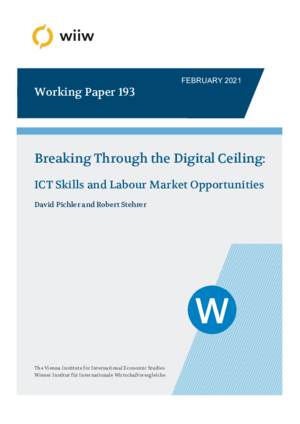Breaking Through the Digital Ceiling: ICT Skills and Labour Market Opportunities
David Pichler and Robert Stehrer
wiiw Working Paper No. 193, February 2021
41 pages including 13 Table and 6 Figures
This paper analyses the impact of ICT-skills on individuals’ labour market mobility patterns, in particular job-to-job, employment- to-unemployment and unemployment-to-employment transitions. Based on the OECD’s Programme for the International Assessment of Adult Competencies (PIAAC) and longitudinal EU-SILC data, individuals’ labour market outcomes are examined over the period 2011-2017 in nine EU countries and the UK. Our results indicate that individuals with strong ICT skills have better opportunities and are therefore not only more likely to change jobs more frequently but are also less likely to face unemployment. Furthermore, ICT skills support unemployment exit towards medium and high digital occupations. A certain minimum level of ICT skills also supports unemployment exit towards low digital occupations but seems to make employment in such occupations less likely once this threshold is crossed. Overall, ICT skills have less predictive power for transition towards medium digital occupations. Thus, while ICT skills appear to improve labour market opportunities significantly, it seems that there are still jobs that require relatively few ICT skills.
Keywords: digital skills, labour market transitions
JEL classification: C25, J23, J24
Countries covered: European Union, United Kingdom
Research Areas: Labour, Migration and Income Distribution
